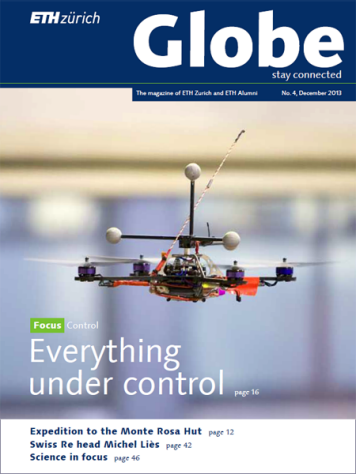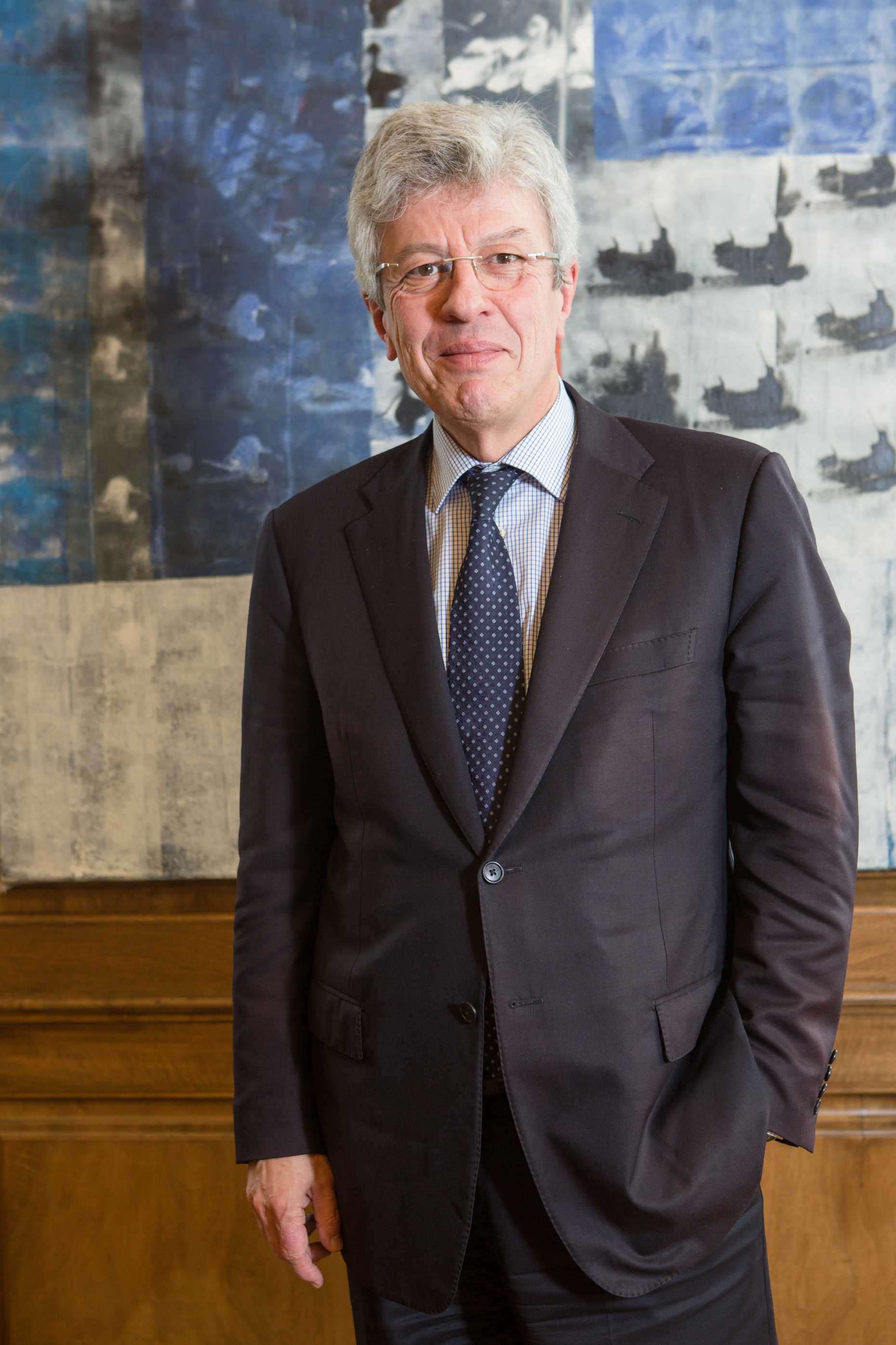A mathematician of the world
Michel Liès, CEO of Swiss Re, headed out into the big, wide world when still a young mathematician. For the last thirty years he has been active on the international stage for the Swiss reinsurance company.

This article has been published in Globe, no. 4/December 2013.
Read the magazine online or subscribe to the print magazine.
150 years of Swiss Re – how does it feel to be the sesquicentennial CEO of the second-biggest reinsurance company in the world? “I’m proud and very happy to have got to this position”, says Michel M. Liès, who has been working for the company for over thirty years and took over the helm in February 2012. For him it is a special honour – especially in a company whose success is founded on trust and sustainability.
When it comes to explaining why risk management is so important for our world, this native Luxembourger is in his element: “As a mathematician, I have always found it fascinating to be able to create a successful business model with scientific analyses.” It is every insurance company’s business to deal with trust based on mathematical formulae. International orientation is a hallmark of every reinsurer. And being internationally active was always a dream for Liès: “When I travelled to Brazil after my degree, I met many engineers who were building motorways and bridges all over the world. Hearing stories like that, I almost regretted being a mathematician.” However, the reinsurance company gave him the opportunity to combine his subject with an international dimension.
Liès ran divisions in Latin America and Europe before becoming responsible for all customer relations as head of Swiss Re Client Markets for six years. Apart from French, his mother tongue, he also speaks fluent English, German, Italian, Portuguese and Spanish. How important are these language skills alongside the “global language” of mathematics?
“Mathematics is an international language. But it has also got its pitfalls”, says Swiss Re’s CEO. Don’t think for a minute that our planet only listens to the laws of mathematics and models. “Mathematics might be good at describing the facts, but in our industry the perception of people is no less pivotal.” After all, at the end of the day people only take out insurance if they are afraid that they might be affected by a particular event.
And the perception of risks depends on the cultural context, as a large-scale study impressively demonstrates in which Swiss Re surveyed 22,000 people in nineteen different countries to coincide with its birthday celebrations. For instance, people in many Latin American countries primarily fear criminality, whereas Europeans tend to worry more about the global economic situation. Just how much perception is shaped by subjective feelings is also reflected in the fact that 22 percent of the respondents in North America indicated that they had gone hungry once in the last year; in India, however, it was only 19 percent.
Potentially, the difference between perception and reality also opens up opportunities for insurance companies, such as if someone estimates a risk as being higher than it actually is and is prepared to pay more as a result. However, this prospect does not necessarily pay off for insurance companies in the end. “In the long run, we have to work on reconciling perception and reality. Our credibility depends on the fact that we realise useful projects and actually do something for society”, says Liès.
The fact that short and long-term perspectives differ is also evident in disasters. If insurance companies have to fork out next to nothing after severe floods or earthquakes, this might be seen positively by the financial markets. However, that is a very short-term view.
After all, if the injured parties do not enjoy any insurance cover, this also means that the insurance companies in the regions affected are not doing any business. An analysis conducted by Swiss Re, for instance, revealed that, on average, only some 20 to 25 percent of the economic damage in disasters is covered, and in certain regions the rate is close to zero percent. Consequently, there is great market potential.
“If we want to provide the market with insurance services more effectively, we can go one of two ways”, explains Liès: “We can sit back and wait until everyone belongs to the middle class and can afford private insurance cover. Or we can develop concepts and products for new potential customer segments, such as governments.” At the same time, micro-insurance solutions need to be developed for those who cannot really afford insurance. In order to take this route, Swiss Re founded the Global Partnerships Department a number of years ago.
As Chairman of Global Partnerships, Michel Liès spent two years talking to government officials to familiarise them with insurance instruments. “In my conversations with finance ministers about insurance, I realised that their knowledge of it was often limited”, he says, looking back. Gradually, the conversations bore fruit. Mexico and the US state of Alabama bought insurance services, for instance. And not only for the state’s assets, but also for individual goods of their citizens. After all, these governments realised that they have to jump in after a disaster, when people have lost everything.
Essentially, however, these conversations were far more about sharpening the consciousness for dealing with risks than about individual business transactions. One of the biggest success stories in this respect, he says, was the fact that the US Treasury Department decided to appoint a Chief Risk Officer to identify the country’s main risks and develop scenarios for how to tackle them.
When Swiss Re comes up anywhere around the world, Switzerland is ever-present in the name. Sustainability, trust and innovation – values that are central to insurance companies – are often associated with Switzerland, too. And so it is no coincidence that Zurich has blossomed into one of the world’s main hubs for insurance companies. Plus there are the city’s many educational opportunities, which Liès describes as “fantastic.” And of course there is the possibility of research collaboration. For instance, Swiss Re is one of the founding partners of ETH Zurich’s Risk Centre.
“A company can position itself across the world as strongly as it wants, but it will never be as international or possess as much raw talent at the cutting edge as a university”, says the CEO, explaining his company’s commitment. To mark the company’s landmark birthday, the Swiss Re Foundation has renewed this research partnership for a further five years. Here, too, it is all about sustainability, as Liès explains: “Our involvement at ETH Zurich might incur costs in the short term, but it helps us to keep our eye on the ball in the long run.”
About Michel Liès
Michel Liès completed a degree in mathematics at ETH Zurich in 1974 and joined Swiss Re four years later. This native Luxembourger was initially involved in the Latin American markets. From 2000 to 2005 he ran the Europe Division before assuming responsibility for all customer relations worldwide as Head of Swiss Re Cl ient Markets. In 2011/12 Liès was Chairman of Global Partnerships and devoted himself to cultivating long-term relationships with representatives of governments and NGOs. He has been CEO of the reinsurance company since 1 February 2012.

Comments
No comments yet